Glimpses of Vedanta in the Purva Mimamsa doctrine
144 views
Skip to first unread message
V Subrahmanian
Oct 29, 2021, 7:38:22 AM10/29/21
to Advaitin
In the Jaimini doctrine one can see many Upanishadic passages cited. The two seminal texts of this system, Kumarila Bhatta's 'Tantra Vartika' and 'Shloka Vartika' too one encounters passages from the Vedanta.
Commentary to Tantra Vartika, 'Nyaya Sudah' of Bhatta Someshwara, too has discussed the Vedantic concepts of Saguna and Nirguna Brahman and their application in the Mimamsa doctrine.
So also the 'Mimamsa shastra kutuhala' of Kamalakara Bhatta too cites Kumarila Bhatta so conclude that the moksha of this doctrine is non-different from that of the Vedanta.
Also, Sri Ayyanna Dikshita in his 'Vyasa Tatparya Nirnaya' has cited the Shloka Vartika and Parthasarathy Misra's 'Shastra Dipika' to emphasise that the Mimamsa doctrine has considered Advaita alone as their Vedantic opponent and rejected it.
Images from all the above texts are appended below:
Nyaya sudha:

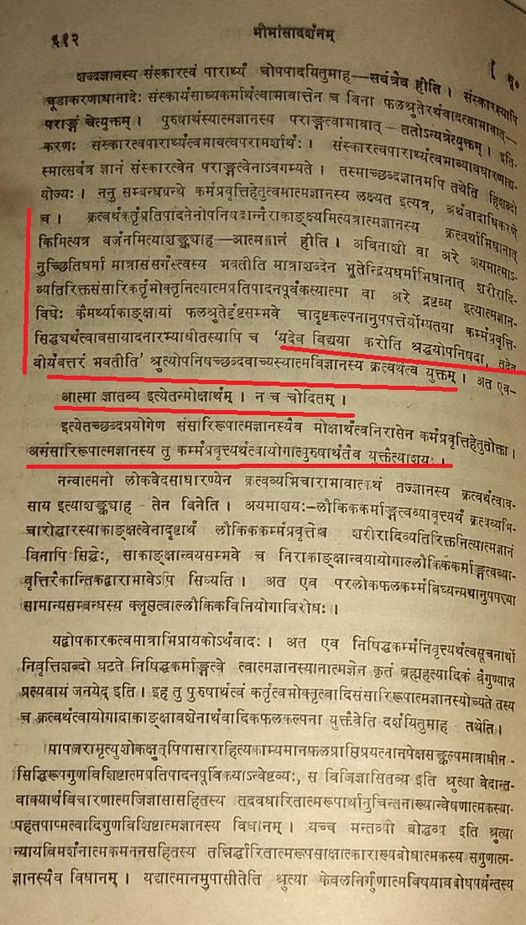
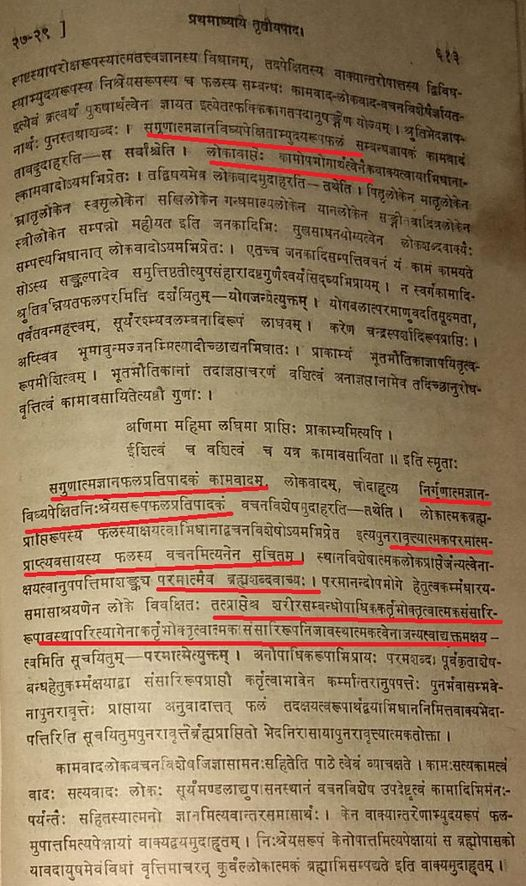
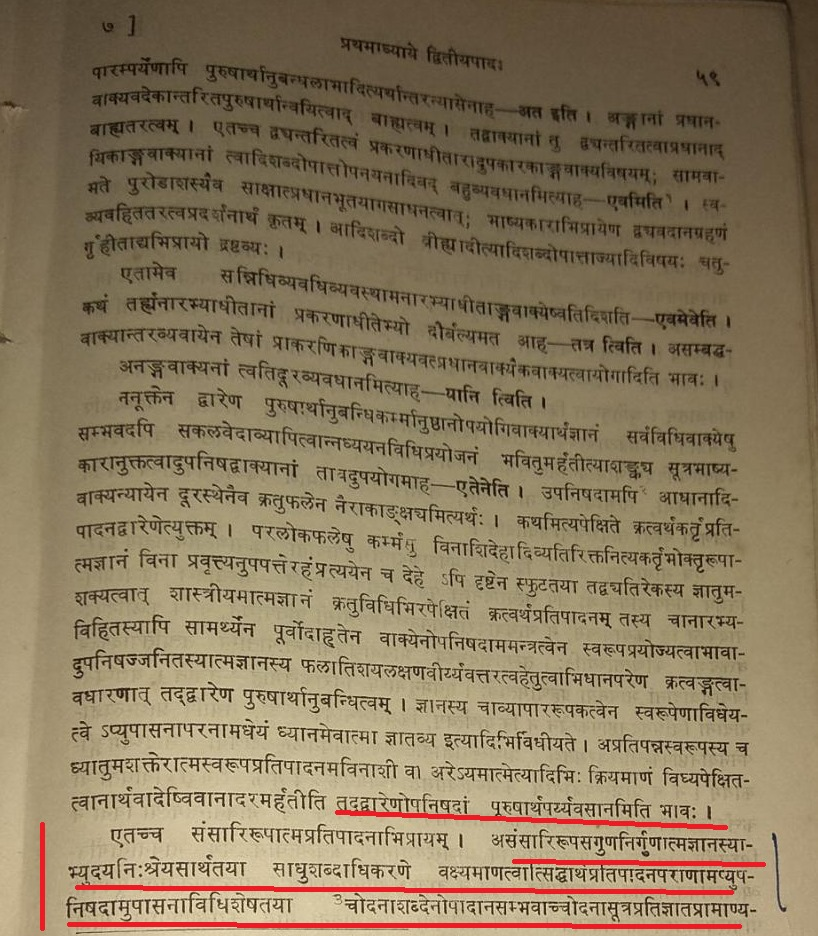
From Miamsa shastra Kutuhala:
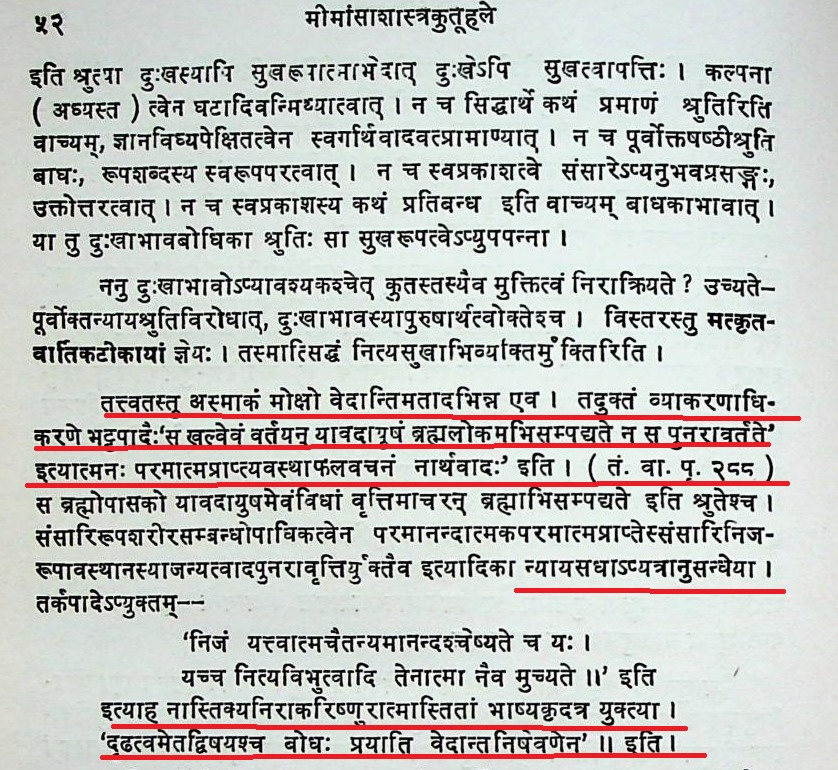
From 'Vyasa Tatparya Nirnaya':

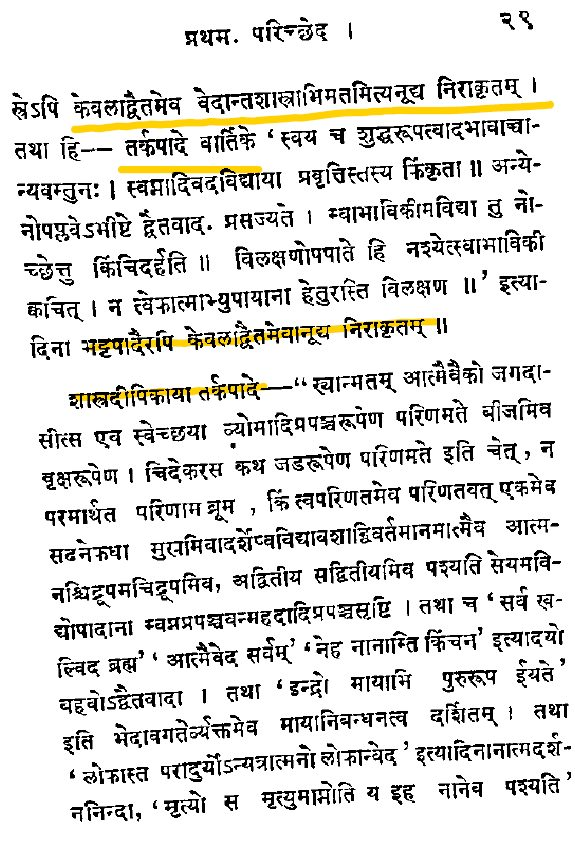
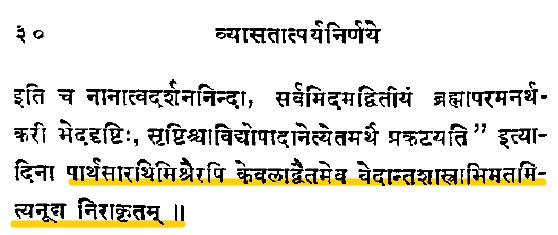
Om Tat Sat
subbu
Vinodh
Oct 29, 2021, 8:09:26 AM10/29/21
to Advaitin
On Fri, Oct 29, 2021 at 5:08 PM V Subrahmanian <v.subra...@gmail.com> wrote:
In the Jaimini doctrine one can see many Upanishadic passages cited. The two seminal texts of this system, Kumarila Bhatta's 'Tantra Vartika' and 'Shloka Vartika' too one encounters passages from the Vedanta.Commentary to Tantra Vartika, 'Nyaya Sudah' of Bhatta Someshwara, too has discussed the Vedantic concepts of Saguna and Nirguna Brahman and their application in the Mimamsa doctrine.So also the 'Mimamsa shastra kutuhala' of Kamalakara Bhatta too cites Kumarila Bhatta so conclude that the moksha of this doctrine is non-different from that of the Vedanta.
Namskaram Sri Subbuji,
I had thought that the "moksha" of Mimamsa was Svarga, which is a result of actions, and not the same as the moksha of Vedanta, which arises out of jnana.
Is the above statement saying that this is not so in Kumarila Bhatta's work on Mimamsa, and that the moksha of both Mimamsa and Vedanta are the same?
If so, what reason could there be to consider Vedanta as being opposed to Mimamsa?
(In the above, I am using Vedanta to mean Advaita Vedanta.)
Also, Sri Ayyanna Dikshita in his 'Vyasa Tatparya Nirnaya' has cited the Shloka Vartika and Parthasarathy Misra's 'Shastra Dipika' to emphasise that the Mimamsa doctrine has considered Advaita alone as their Vedantic opponent and rejected it.Images from all the above texts are appended below:Nyaya sudha:From Miamsa shastra Kutuhala:From 'Vyasa Tatparya Nirnaya':Om Tat Satsubbu
--
You received this message because you are subscribed to the Google Groups "advaitin" group.
To unsubscribe from this group and stop receiving emails from it, send an email to advaitin+u...@googlegroups.com.
To view this discussion on the web visit https://groups.google.com/d/msgid/advaitin/CAKk0Te2p_HT_gspH2hmGhiq81kEebJ9k%3DnbvDHS1XakzuAk4mg%40mail.gmail.com.
V Subrahmanian
Oct 29, 2021, 8:21:04 AM10/29/21
to Advaitin
On Fri, Oct 29, 2021 at 5:39 PM Vinodh <vinod...@gmail.com> wrote:
On Fri, Oct 29, 2021 at 5:08 PM V Subrahmanian <v.subra...@gmail.com> wrote:In the Jaimini doctrine one can see many Upanishadic passages cited. The two seminal texts of this system, Kumarila Bhatta's 'Tantra Vartika' and 'Shloka Vartika' too one encounters passages from the Vedanta.Commentary to Tantra Vartika, 'Nyaya Sudah' of Bhatta Someshwara, too has discussed the Vedantic concepts of Saguna and Nirguna Brahman and their application in the Mimamsa doctrine.So also the 'Mimamsa shastra kutuhala' of Kamalakara Bhatta too cites Kumarila Bhatta so conclude that the moksha of this doctrine is non-different from that of the Vedanta.Namskaram Sri Subbuji,I had thought that the "moksha" of Mimamsa was Svarga, which is a result of actions, and not the same as the moksha of Vedanta, which arises out of jnana.Is the above statement saying that this is not so in Kumarila Bhatta's work on Mimamsa, and that the moksha of both Mimamsa and Vedanta are the same?
That the jiva is not karta-bhokta in Moksha is similar to Advaita. They do not hold the world to be mithya.
regards
subbu
--If so, what reason could there be to consider Vedanta as being opposed to Mimamsa?(In the above, I am using Vedanta to mean Advaita Vedanta.)--Also, Sri Ayyanna Dikshita in his 'Vyasa Tatparya Nirnaya' has cited the Shloka Vartika and Parthasarathy Misra's 'Shastra Dipika' to emphasise that the Mimamsa doctrine has considered Advaita alone as their Vedantic opponent and rejected it.Images from all the above texts are appended below:Nyaya sudha:From Miamsa shastra Kutuhala:From 'Vyasa Tatparya Nirnaya':Om Tat Satsubbu
You received this message because you are subscribed to the Google Groups "advaitin" group.
To unsubscribe from this group and stop receiving emails from it, send an email to advaitin+u...@googlegroups.com.
To view this discussion on the web visit https://groups.google.com/d/msgid/advaitin/CAKk0Te2p_HT_gspH2hmGhiq81kEebJ9k%3DnbvDHS1XakzuAk4mg%40mail.gmail.com.
You received this message because you are subscribed to the Google Groups "advaitin" group.
To unsubscribe from this group and stop receiving emails from it, send an email to advaitin+u...@googlegroups.com.
To view this discussion on the web visit https://groups.google.com/d/msgid/advaitin/CAC%2BJcJLB%2BfUWC%3DyGcLR9kkwiMthgvOeyQdTOyJSAHSJ60U72kQ%40mail.gmail.com.
Vinodh
Oct 29, 2021, 10:04:01 AM10/29/21
to adva...@googlegroups.com
On Fri 29. Oct 2021 at 17:51, V Subrahmanian <v.subra...@gmail.com> wrote:
On Fri, Oct 29, 2021 at 5:39 PM Vinodh <vinod...@gmail.com> wrote:On Fri, Oct 29, 2021 at 5:08 PM V Subrahmanian <v.subra...@gmail.com> wrote:In the Jaimini doctrine one can see many Upanishadic passages cited. The two seminal texts of this system, Kumarila Bhatta's 'Tantra Vartika' and 'Shloka Vartika' too one encounters passages from the Vedanta.Commentary to Tantra Vartika, 'Nyaya Sudah' of Bhatta Someshwara, too has discussed the Vedantic concepts of Saguna and Nirguna Brahman and their application in the Mimamsa doctrine.So also the 'Mimamsa shastra kutuhala' of Kamalakara Bhatta too cites Kumarila Bhatta so conclude that the moksha of this doctrine is non-different from that of the Vedanta.Namskaram Sri Subbuji,I had thought that the "moksha" of Mimamsa was Svarga, which is a result of actions, and not the same as the moksha of Vedanta, which arises out of jnana.Is the above statement saying that this is not so in Kumarila Bhatta's work on Mimamsa, and that the moksha of both Mimamsa and Vedanta are the same?That the jiva is not karta-bhokta in Moksha is similar to Advaita. They do not hold the world to be mithya.regardssubbu
Interesting to know. Thank you. 🙏
To view this discussion on the web visit https://groups.google.com/d/msgid/advaitin/CAKk0Te1vwScKZrz18OsTON9KUjt%3Dg%3D%2BWxp7K5idErpn4Yofgsg%40mail.gmail.com.
Raghav Kumar
Oct 29, 2021, 11:56:08 PM10/29/21
to adva...@googlegroups.com, Vinodh, A discussion group for Advaita Vedanta
Namaste Subbu ji
Is there any reference in any mImAmsA text regarding the absence of kartRtva and even bhoktRtva in their highest attainment?
Indeed, the usual theological VaiShNava dvaitins are no where in the picture in the engagement and ancient debates between Advaita and mImAmsA. (I think that is the main point you were making in your post?)
At a popular level even with many Advaita students, mImAmsa is wrongly associated *only* with karmas (understood as fire rituals involving homas, Yajnas etc with some upAsana). I was disabused of this notion when reading an outline of the great mImAmsaka sri maNDana miSra's brahma siddhi. The clear emphasis is seen on saguNa brahma upAsana and nididhyAsana (albeit without a pramANa based approach) of the aham-brahmAsmi mahAvAkya. (In such a mImAmsaka view of nididhyAsana meditation, the word implies nirguNa upAsana rather than how advaitins view nididhyAsana as part of pramANa operation.)
Clearly they came very close to Advaita with the GYAna karma samyccaya idea but stopped short of accepting GYAnam as the sufficient means for moxa. And therefore, to caricaturize all mImAmsakas as merely committed to Yajnas for attaining svarga is incorrect. GYAna karma samyccaya vAda is also there in mImAmsa. There, the person attains moxa by constant dhyAnam/upAsanam (which involves effort and is puruSa-tantra) on the vedAntic mahAvAkyas. The word nididhyAsanam is used for that too by them. This type of mImAmsaka nididhyAsanam is distinguished from vedAntic nididhyAsanam (which is pramANa-based) in upadesha sAhasrI. All these debates show the close proximity of the two systems of mImAmsA and Advaita.
Om
Raghav
V Subrahmanian
Oct 30, 2021, 4:34:53 AM10/30/21
to Advaitin, Vinodh, A discussion group for Advaita Vedanta
On Sat, Oct 30, 2021 at 9:26 AM 'Raghav Kumar' via advaitin <adva...@googlegroups.com> wrote:
Namaste Subbu jiIs there any reference in any mImAmsA text regarding the absence of kartRtva and even bhoktRtva in their highest attainment?
I don't think there would be such a reference but that their moksha is not different from the Vedantic (Advaitic) moksha is enough ground to hold so. The statement of the commentator Kamalakara Bhatta citing the Vartika of Kumarila Bhatta (pl see the image below in this original post). Paramatma prapti and tne 'nija' svarupa of the jiva - these are the terms that he admits and that is enough indication to hold that the jiva in its true state is not karta-bhokta.
Indeed, the usual theological VaiShNava dvaitins are no where in the picture in the engagement and ancient debates between Advaita and mImAmsA. (I think that is the main point you were making in your post?)
Indeed yes. Sri Ayyanna Dikshita in his 'Vyasa Tatparya Nirnaya' has cited from the authentic texts of all schools opposed to Vedanta to establish that all of them considered Advaita alone as Vedanta and refuted the tenets thereof.
At a popular level even with many Advaita students, mImAmsa is wrongly associated *only* with karmas (understood as fire rituals involving homas, Yajnas etc with some upAsana). I was disabused of this notion when reading an outline of the great mImAmsaka sri maNDana miSra's brahma siddhi. The clear emphasis is seen on saguNa brahma upAsana and nididhyAsana (albeit without a pramANa based approach) of the aham-brahmAsmi mahAvAkya. (In such a mImAmsaka view of nididhyAsana meditation, the word implies nirguNa upAsana rather than how advaitins view nididhyAsana as part of pramANa operation.)Clearly they came very close to Advaita with the GYAna karma samyccaya idea but stopped short of accepting GYAnam as the sufficient means for moxa. And therefore, to caricaturize all mImAmsakas as merely committed to Yajnas for attaining svarga is incorrect. GYAna karma samyccaya vAda is also there in mImAmsa. There, the person attains moxa by constant dhyAnam/upAsanam (which involves effort and is puruSa-tantra) on the vedAntic mahAvAkyas. The word nididhyAsanam is used for that too by them. This type of mImAmsaka nididhyAsanam is distinguished from vedAntic nididhyAsanam (which is pramANa-based) in upadesha sAhasrI. All these debates show the close proximity of the two systems of mImAmsA and Advaita.
Regarding that last observation above, yes, in fact Sri Mani dravid Sastrigal's Ph D thesis is on the very subject of such closeness. It is being published by an institution and when it is released we can get to read it.
regards
subbu
To view this discussion on the web visit https://groups.google.com/d/msgid/advaitin/1453512808.2332869.1635566135629%40mail.yahoo.com.
Reply all
Reply to author
Forward
0 new messages
















